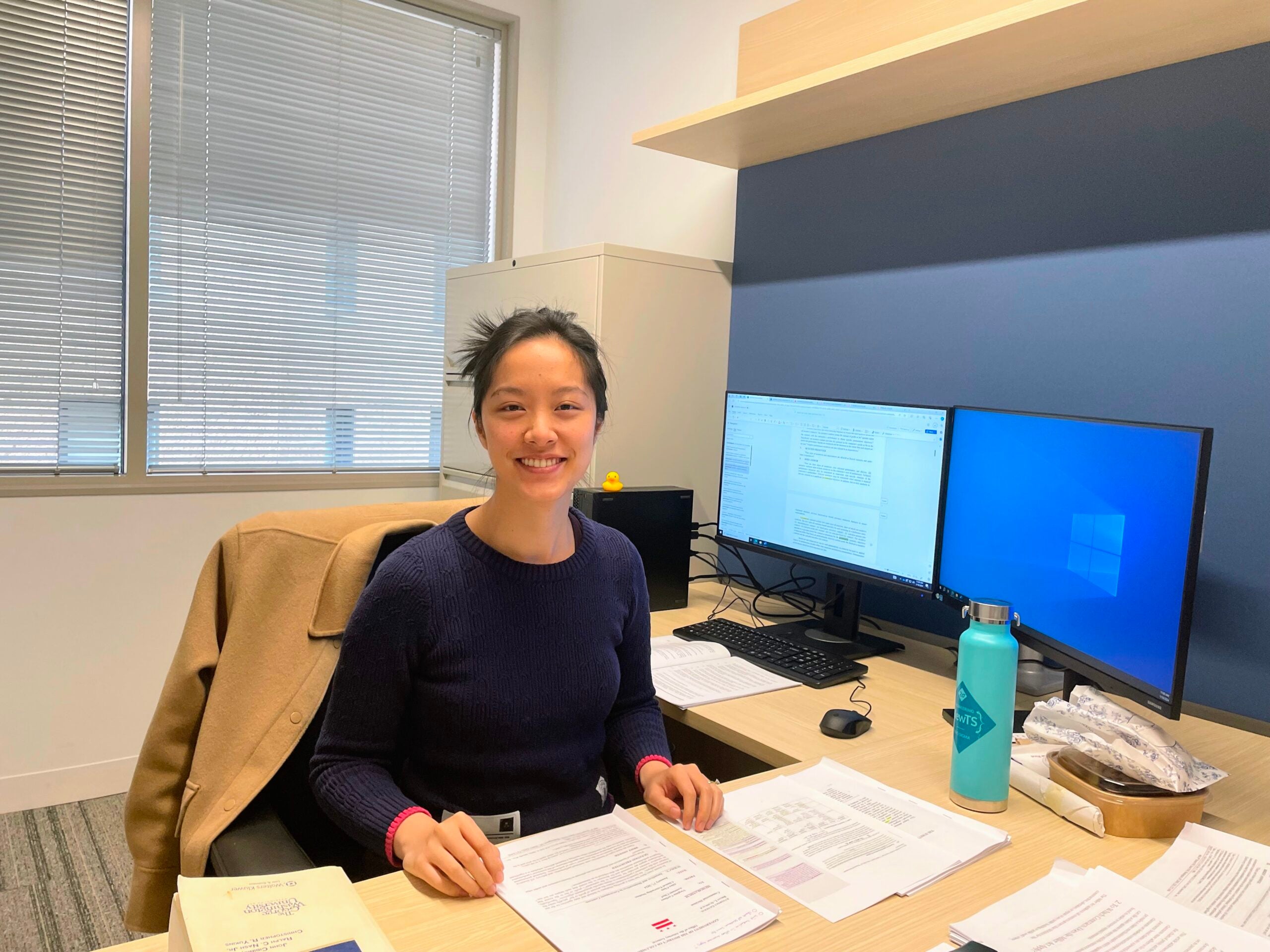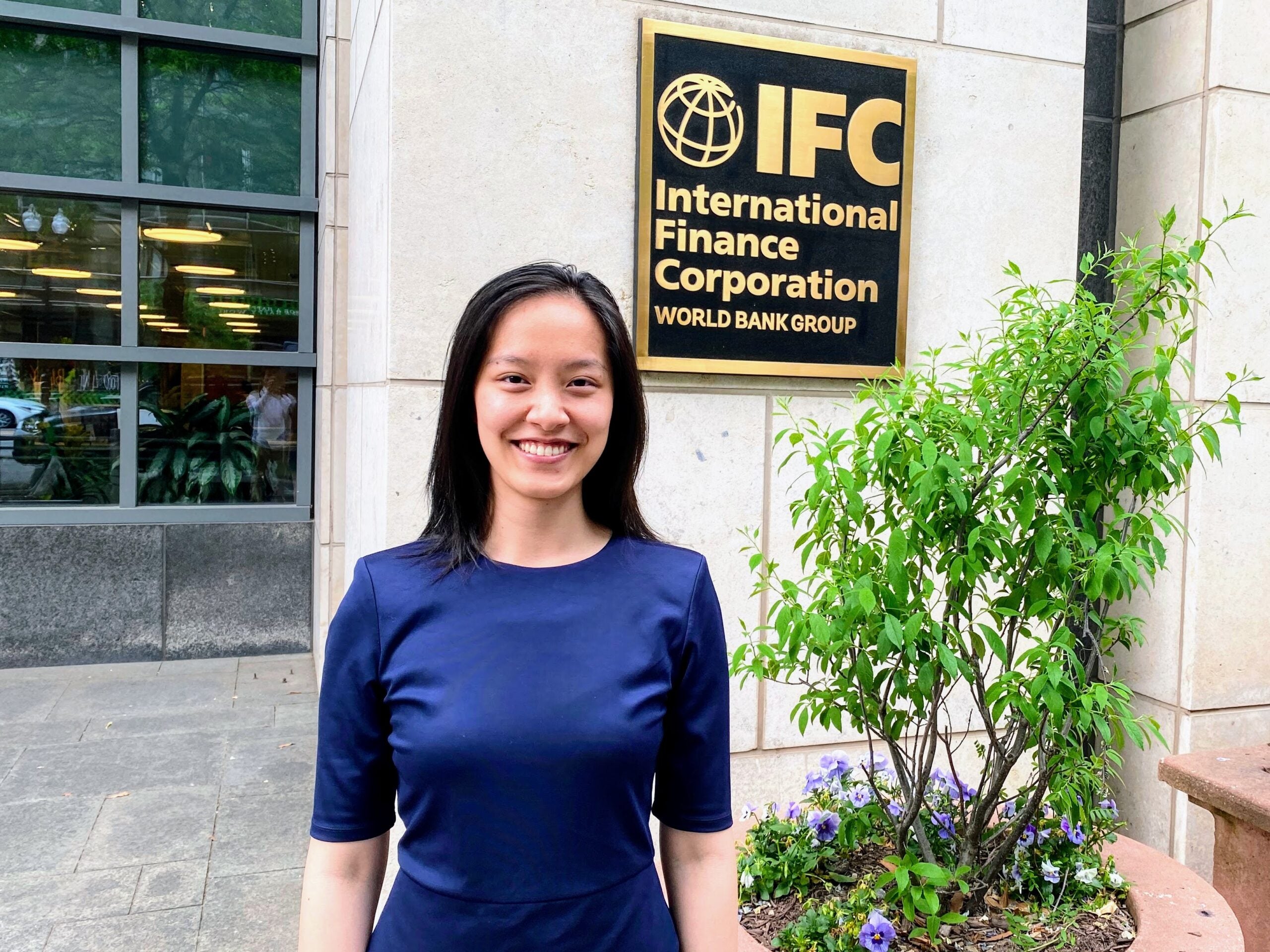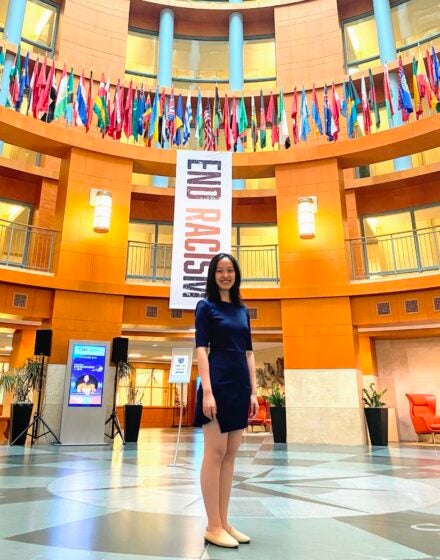Exploring business law through Government Lawyer Clinics: Attorney General and Semester in Washington
By Alice Chen ’24
Like many of my peers, I had thought that Washington, D.C. was one of the best training grounds for aspiring litigators but not so much for someone like me who gravitated more toward transactional law. But I loved the idea of experiential learning through an immersive externship clinic and would jump at any opportunity to continue my Harvard education in D.C., where my partner resided. With those goals in mind, I started looking into the Government Lawyer Clinics.
Little did I know that the generous guidance and support from OPIA and OCP advisors, clinical instructors, and alumni would lead to two distinct yet equally enriching externships in D.C. This past January, I spent three weeks working in the Government Contracts Section of the Commercial Division at the Office of the Attorney General for the District of Columbia (“OAG”) under the Attorney General Clinic. In the next three months, I participated in the Semester in Washington (“SiW”) Program, working at the International Finance Corporation (“IFC”), a World Bank Group member and the largest global development institution focused exclusively on the private sector.
Where I Worked & What I Did
The Commercial Division at OAG provides legal services, advice, and advocacy related to numerous core governmental functions, including the procurement of goods and services. Specifically, the Government Contracts Section reviews proposed District contracts, provides legal advice regarding procurement laws and regulations, and represents the District in bid protests and contract disputes.

Credit: David Fisher
My first project at OAG was to draft and present a memorandum on permissible and impermissible incentives in District contracts. I enjoyed applying my math background to illustrating and comparing different types of incentives used in contracts. My colleagues appreciated my interdisciplinary approach and asked insightful questions directed to my illustrations and other parts of my presentation. My second project involved a District contractor bankruptcy case. I helped the team construct a detailed timeline and analyzed priority issues. I found the fact finding and legal research fascinating and only wished that the externship was longer.
As one of the five World Bank Group institutions, IFC shares the World Bank Group’s vision and mission to create a world free of poverty on a livable planet. Specifically, IFC helps developing countries achieve sustainable growth by financing investment, mobilizing capital in international financial markets, and providing advisory services to businesses and governments. For example, by investing in a growth fund for promising technology startups, IFC brought job opportunities and hope for a better future to Ukraine.
My IFC placement was with the Business Risk and Compliance Department (“CBR”), and I also worked on a project with an attorney in the Legal Department (“CLED”) toward the end of my externship. CBR establishes and reinforces high standards of conduct and management of business risk, encompassing areas such as integrity, anti-money laundering, tax, and data privacy. Additionally, CLED provides legal services and solutions to enable the delivery of IFC’s investment and advisory program across industries and regions.
My spring externship at IFC gave me ample time to work on a variety of projects that aligned with my interest in business law. In addition, it coincided with the busiest time at IFC—the end of IFC’s fiscal year. My mentors and colleagues never hesitated to include me in events, meetings, and projects. I attended the World Bank Group Data Privacy Day Celebrations, a Multilateral Development Bank / Development Finance Institution Tax Symposium, the annual Spring Meetings of the World Bank Group and the International Monetary Fund, and the opening ceremony of the Women in Trade exhibit set up in IFC’s wellness center in celebration of the Women’s History Month. Thanks to the IFC team, I had an action-packed twelve-week externship during which I had the pleasure to work with 18 colleagues on 21 assignments.
Why We Loved Our Work
Being able to uphold the law and represent the public interest is one of the main reasons that OAG attorneys love their work, which aligns with what Jim and Peter covered in The Role of the State Attorney General Seminar in the fall. I appreciated the attorneys’ candor—they were refreshingly transparent about the reality of their work, such as the unavoidable sluggishness of bureaucratic processes.
Like my OAG mentors, my IFC colleagues love what they do at work because of the mission. As a uniquely positioned international organization, IFC focuses on areas such as agribusiness, education, gender, and infrastructure. The institution aims to catalyze investments in countries that investors might consider too risky to invest in alone. I observed first-hand how my CLED mentor facilitated negotiations between our investment team and the partnering investor. Together, they brainstormed innovative arrangements that aligned with IFC’s development goals while addressing the business objectives of all parties involved.
I shared a sense of purpose during my time at IFC. My assignments spanned 14 countries and regions. I looked up and reviewed laws, news articles, and documents not only in English but also in Chinese, Arabic, and Russian (with the help of Google Translate and the World Bank Group’s in-house AI-aided translation tool). Some of my tasks concerned investment projects in sectors such as healthcare, renewable energy, and financial institutions. I was both humbled and proud to see how my research and due diligence work fed into my CBR mentors’ comprehensive risk assessment for the investment projects. Knowing that my work would contribute to funding small and medium-sized enterprises in fragile and conflict-affected situations inspired a particular sense of urgency in me.

Credit: Mohamed ElBaih
Diversity & Inclusion
While I found my work at OAG interesting, I was most impressed with the attorneys’ kindness and generosity. I met and interacted with over a dozen attorneys from diverse backgrounds during my time at OAG. They were universally welcoming, greeting me in the hallway, popping into my office to introduce themselves and share insights about their roles, and genuinely trying to get to know me on a personal level. Some of them even took time out of their busy schedules to review drafts of my work and write detailed comments under tight timelines. To illustrate, my memo on incentive contracts underwent five rounds of revision within a single week.
At IFC, I was struck by the remarkable diversity of the workplace. When I was assigned to sit in a row with three CBR consultants, we realized that each of the four of us came from a different country: India, Bolivia, Egypt, and China. During the first week of my externship, I attended a concert in which a Senegalese kora player and singer performed with a French accordion player. Almost every week, we would get an email from a CBR colleague announcing an international snack or two that they had brought from home, vacation, or business travel, now available in the pantry.
In addition to the wide array of countries represented at IFC, CBR is a particularly diverse team in terms of people’s professional backgrounds. I worked alongside lawyers, accountants, investigators, auditors, tech experts, and data engineers. Prior to joining CBR, I had no idea that modern compliance departments encompass more than legal professionals. I was fascinated to see how our diverse perspectives complemented each other and converged into an interdisciplinary approach in various aspects of our work.
With diversity came inclusion. People always listened to each other and engaged respectfully with an open mind even when hot-button issues came up in work-related or informal discussions. Inclusion was also shown in action: Despite my absolute lack of physical coordination, a group of IFC colleagues (whom I barely knew at the time) invited me to join their K-pop dance for IFC’s annual talent show. After we practiced on weekends for a month, our performance served as the grand finale of the show. Others had sung songs, played the piano, and recited poetry. Notably, my Egyptian friend and row-mate was on stage too—he beatboxed with a flute and a harmonica!
A Journey to Remember
On reflection, my journey exploring business law in D.C. through the Government Lawyer Clinics at Harvard was transformative. From the invaluable guidance and mentorship at OAG to the diverse work and inclusive culture at IFC, these experiences not only honed my business law acumen but also reaffirmed the significance of mission and inclusion in the legal profession. Spending the last two terms in the capital city of the United States was the ideal culmination of my legal education. It made me realize, and I quote Jonathan (Director of the SiW Program) directly, that “In whatever you do next and throughout your career, there will be opportunities for you to serve.”
Acknowledgements
Virginia Carliner, David Fisher, Will Higginbothom, Jeffrey Jiang, Ceri Lawley, Weihong Leyden, Anna Populorum, Sheila Schreiber, Faisal Sidiqqui, and Collin Swan offered invaluable feedback on drafts of this post. Additionally, Peter Brann, Mohamed ElBaih, Tom Roth, Jim Tierney, and Jonathan Wroblewski graciously reviewed an earlier version. Any remaining errors are solely my responsibility.
Filed in: Clinical Student Voices
Tags: Class of 2024, Government Lawyer - State Attorney General Clinic, Government Lawyer: Semester in Washington Clinic
Contact Office of Clinical and Pro Bono Programs
Website:
hls.harvard.edu/clinics
Email:
clinical@law.harvard.edu
